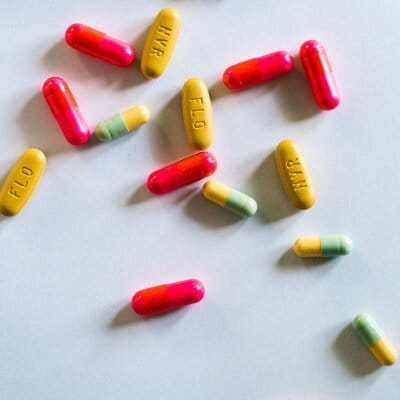Dog Ate Calcium Pills (8 Expert Tips)

Oops!! What to Do When Your Dog Ate Calcium Pill
In this blog post, we’ll explore what to do if your dog ate calcium pill and how to prevent such incidents in the future. Dogs have a talent for finding things they shouldn’t, and if your gut tells you that your dog ate calcium pill, keep an eye out for signs. Look for changes in behavior like these might signal trouble.
- Lethargy
- Vomiting
- Loss of appetite
- Diarrhea
Immediate Steps to Take
In the event you catch your dog mid munch or stumble upon the evidence afterward, swift action is crucial. Contact your vet immediately, providing details about the type and quantity of calcium ingested. Following their advice is key, as they may recommend inducing vomiting if necessary.
Veterinary Visit
Even if your dog seems okay initially, a trip to the vet is a must. A thorough examination and potential tests will help the vet gauge the overall health of your furry companion. Knowing the calcium levels in your dog’s system is vital for crafting an effective treatment plan.
Treatment Options
Treatment varies based on the severity of the situation. Your vet may prescribe medications to counteract excess calcium effects or suggest intravenous fluids to flush out the surplus from your dog’s system.
Prevention
Avoiding situations where your dog can get their paws on harmful items is the best approach. Keep medications, including calcium pills, securely stored in cabinets or containers out of your dog’s reach. A little prevention goes a long way.
Keep an Eye Out
Supervision is key, especially in areas where your dog might encounter potential hazards. A watchful eye can prevent unintended snacking and keep your pup out of harm’s way.
Training and Positive Reinforcement
Train your dog to steer clear of certain areas or items through positive reinforcement. Consistent encouragement of good behavior and discouragement of undesirable actions can create a safer environment for your dogs.
Regular Vet Checkups
Routine veterinary checkups are essential to monitor your dog’s health. Regular examinations can help detect underlying problems early on and ensure your pup stays in tip top shape.
Can dogs eat calcium pills
Feeding calcium pills to dogs should be approached with caution, and it’s generally not recommended without veterinary guidance. While calcium is an essential nutrient for dogs, the dosage and form matter significantly. Too much calcium can lead to health issues such as skeletal abnormalities and kidney problems, especially in growing puppies. If a dog needs a calcium supplement, it should be given under the supervision of a veterinarian who can determine the appropriate dosage based on the dog’s specific needs.
It’s crucial to avoid self prescribing and feeding dogs human calcium pills, as they may contain additional ingredients that could be harmful. Always consult with a vet to ensure your dog’s nutritional needs are met in a safe and balanced manner.
Symptoms of Calcium Supplements Poisoning in Dogs
We’ll delve into the symptoms of calcium supplements poisoning in dogs, helping you recognize the red flags and take swift action to ensure their well being.
- Gastrointestinal Distress: One of the initial signs of calcium supplements poisoning in dogs is gastrointestinal distress. Keep an eye out for symptoms like vomiting, diarrhea, or excessive drooling. If you notice these signs, it’s time to investigate further.
- Loss of Appetite: A sudden loss of appetite in your dog can be a concerning indication of an underlying issue. If your pup refuses their favorite treats or meals, it might be linked to calcium supplements poisoning.
- Lethargy: Dogs are known for their playful energy, so if you observe a significant decrease in activity levels or an unusual lethargy, it could be a sign that something is amiss. Pay attention to changes in your dog’s usual behavior.
- Excessive Thirst and Urination: Too much calcium can affect the kidneys, leading to increased thirst and urination in dogs. If you notice your furry friend drinking more water than usual or needing to go outside more frequently, consider it a potential red flag.
- Muscle Weakness or Tremors: Calcium supplements poisoning may manifest in physical symptoms such as muscle weakness or tremors. If your dog struggles to move normally or experiences involuntary shaking, it’s crucial to seek veterinary attention promptly.
- Difficulty Breathing: In severe cases, excessive calcium can impact respiratory functions. If you observe your dog having difficulty breathing, panting excessively, or displaying signs of respiratory distress, it’s an emergency situation requiring immediate veterinary care.
- Seeking Professional Help: If you notice any combination of these symptoms or suspect your dog ate calcium pill supplements, contact your veterinarian without delay. Provide details about the type and amount of supplements your dog may have consumed to aid in accurate diagnosis and treatment.
What happen if dog eats calcium pills
Calcium supplements poisoning occurs when dog ate calcium pill excessive amounts, leading to adverse health effects. These supplements, often taken to support bone health, can pose risks when consumed in quantities beyond the recommended dosage. In humans, symptoms may include nausea, vomiting, abdominal pain, and in severe cases, issues like kidney stones.
However, when it comes to our friend, such as dogs, accidentally dog ate calcium pill supplements can lead to different complications, ranging from gastrointestinal distress to more serious conditions. Recognizing the signs of calcium supplements poisoning and seeking prompt medical attention, whether for yourself or your pet, is crucial to mitigating potential harm and ensuring a swift recovery.
Treatment of Calcium Supplements Poisoning in Dogs
When dog ate calcium pill treatment of calcium supplements poisoning in dogs, prompt action is essential. If you suspect your canine companion has ingested excessive calcium supplements, the first step is to seek immediate veterinary attention. The veterinarian will conduct a thorough examination, possibly including blood tests, to assess the severity of the poisoning. Treatment options may vary depending on the individual case, but they often involve measures to reduce calcium absorption and eliminate the excess from the dog’s system.
This could include inducing vomiting, administering medications to bind with calcium, or providing intravenous fluids to flush out the excess from the body. In severe cases, hospitalization might be necessary. The key is to follow the veterinarian’s guidance closely and ensure that your furry friend receives the appropriate care to recover from the effects of calcium supplements poisoning. Remember, early intervention significantly improves the chances of a successful outcome for your beloved pet.

What Is Vitamin D Toxicity in Dogs?
Vitamin D toxicity in dogs occurs when they ingest an excessive amount of this essential vitamin, leading to adverse health effects. Vitamin D is crucial for maintaining proper calcium and phosphorus levels in a dog’s body, but an overdose can result in toxicity. Common sources of vitamin D toxicity in dogs include accidental ingestion of vitamin D supplements meant for humans or exposure to certain rodenticides containing cholecalciferol, a potent form of vitamin D. Symptoms of vitamin D toxicity may include
- Vomiting
- Loss of appetite Increased thirst
- Urination
- In severe cases kidney failure
It’s crucial to be aware of the signs and seek prompt veterinary attention if you suspect your dog has been exposed to excessive vitamin D. Early intervention is key to managing and treating vitamin D toxicity, ensuring the best possible outcome for your furry companion.
Treatment of Vitamin D Poisoning in Dogs
- Identification and Diagnosis: When it comes to treating vitamin D poisoning in dogs, the first step is accurate identification and diagnosis. Recognizing the symptoms early on, such as vomiting, loss of appetite, and increased thirst, is crucial. If you suspect your dog ate calcium pill too much vitamin D, prompt veterinary attention is imperative.
- Decontamination Measures: Depending on the severity of the situation, your vet may initiate decontamination measures. This could involve inducing vomiting to eliminate the ingested vitamin D from your dog’s system. Activated charcoal may also be administered to help prevent further absorption.
- Fluid Therapy: Hydration plays a vital role in the treatment process. Intravenous fluid therapy may be recommended to flush out the excess vitamin D and support kidney function. This step is particularly important as vitamin D toxicity can lead to kidney damage in severe cases.
- Calcium and Phosphorus Regulation: Vitamin D toxicity often disrupts the balance of calcium and phosphorus in the body. Your vet may implement measures to regulate these levels, ensuring they return to a healthy balance. This may involve dietary adjustments or specific medications.
- Monitoring and Supportive Care: Continuous monitoring of your dog’s condition is essential during the treatment process. Supportive care, including medications to address specific symptoms, might be provided to ease discomfort and aid in the recovery process.
- Hospitalization in Severe Cases: In severe cases of vitamin D poisoning, hospitalization may be necessary. This allows for around-the-clock monitoring, intensive treatment, and ensures that your dog receives the care and attention needed for a full recovery.
- Follow-up Veterinary Visits: After the initial treatment, follow-up veterinary visits are crucial to monitor your dog’s progress and make any necessary adjustments to the treatment plan. These visits help ensure that your furry friend is on the road to a complete recovery.

Causes of Calcium Supplements Poisoning in Dogs
- Inadvertent Access: Dogs are notorious for their curious nature, and one common cause of calcium supplements poisoning is their ability to gain access to medications accidentally. Dogs might find and chew on pill bottles left within their reach.
- Misplaced Medications: Sometimes, pet owners unintentionally leave medications in easily accessible places, increasing the risk of dogs getting their paws on calcium supplements. Misplacing pill bottles or leaving them on countertops can lead to unintended ingestion.
- Unsecured Storage: In households with pets, especially dogs, it’s crucial to secure the storage of medications. Leaving calcium supplements in unsecured cabinets or containers can make them an easy target for our furry friends.
- Curiosity and Chewing Behavior: Dogs explore the world through their mouths, and their natural chewing behavior can lead them to discover and consume items they find interesting or unusual. Calcium pills, if accessible, may become an enticing chew toy.
- Owner Administration Errors: Administering medications to dogs requires precision, and errors in dosage can occur. Accidentally giving a dog too many calcium supplements or confusing medications can result in unintentional poisoning.
- Pet Medication Mix-ups: In households with multiple pets, there’s a risk of medication mix-ups. Giving one pet’s medication to another, especially if the dosages are different, can lead to unintended ingestion of excess calcium.
- Children’s Reach: If there are children in the household, there’s a risk of them leaving pill bottles within a dog’s reach. Dogs, being opportunistic eaters, may seize the chance to explore and ingest calcium supplements.
- Lack of Pet-Safe Storage Awareness: Pet owners may not always be aware of the importance of storing medications in pet-safe areas. Lack of awareness about the potential dangers of leaving medications unattended can contribute to the risk of calcium supplements poisoning in dogs.
Being mindful of these potential causes and taking preventive measures, such as secure storage and proper administration, can significantly reduce the likelihood of calcium supplements poisoning in our canine companions.
How Much Vitamin D Is Toxic to a Dog?
Understanding how much vitamin D is toxic to a dog is crucial for responsible pet ownership. While vitamin D is necessary for a dog’s health, an excess can lead to toxicity. The recommended daily allowance for vitamin D varies based on factors like a dog’s size and breed. Generally, around 500 international units (IU) per kilogram of food is considered safe. However, toxicity can occur at much lower levels, and the threshold varies among individual dogs.
Signs of vitamin D toxicity include vomiting, loss of appetite, increased thirst and urination, and in severe cases, kidney failure. It’s vital to be cautious with vitamin D supplements, ensuring they are administered under veterinary guidance and that any potential exposure to vitamin D-containing products, such as rodenticides, is promptly addressed. Regular veterinary check-ups can help monitor your dog’s health and prevent vitamin D toxicity.
Conclusion:
Discovering that your dog ate calcium pill can be a moment of panic, but by acting swiftly and implementing preventive measures, you can help safeguard your dogs health. Stay vigilant, take quick action when needed, and create a safe environment to keep those curious paws away from potential dangers.
FAQs About Dog Ate Calcium Pill
What happens if my dog accidentally eats a vitamin D pill?
If your dog consumes a vitamin D pill, it can lead to vitamin D toxicity. Symptoms may include vomiting, loss of appetite, increased thirst and urination, and, in severe cases, kidney failure. Prompt veterinary attention is crucial.
How much is too much calcium for a dog?
The appropriate amount of calcium for a dog depends on factors like size and breed. Generally, around 500 international units (IU) per kilogram of food is considered safe. However, exceeding this recommended dosage can lead to calcium toxicity.
How do you treat calcium toxicity in dogs?
Treatment for calcium toxicity involves veterinary care. Depending on the severity, measures may include inducing vomiting, administering medications to bind with calcium, intravenous fluid therapy, and regulating calcium and phosphorus levels.
What if my dog just ate calcium carbonate?
Calcium carbonate is a common form of calcium supplement. If your dog ingests it, contact your vet immediately. The vet will assess the situation and recommend appropriate treatment, which may include decontamination measures and supportive care.
Is calcium poisonous to dogs?
While calcium is essential for dogs, excessive amounts can lead to toxicity. It’s crucial to provide the right dosage through a balanced diet and, if needed, under veterinary guidance. Accidental ingestion of large quantities can be harmful.
Is it bad if my dog ate my vitamins?
It depends on the specific vitamins and minerals in the supplement. Some vitamins, like vitamin D, can be toxic in excess. If your dog consumes your vitamins, especially those containing potentially harmful ingredients, seek veterinary advice.
Will one vitamin D pill hurt my dog?
While one vitamin D pill might not cause immediate harm, it’s essential to be cautious. The risk of toxicity increases with higher doses. If your dog ingests any vitamin D pills, contact your vet to assess the situation and determine the appropriate course of action.
What vitamins are toxic to dogs?
Various vitamins, including vitamin D, can be toxic to dogs in excessive amounts. Other potentially harmful vitamins include vitamin A, iron, and certain B vitamins. Always keep human medications and supplements out of reach, and consult your vet if accidental ingestion occurs.






